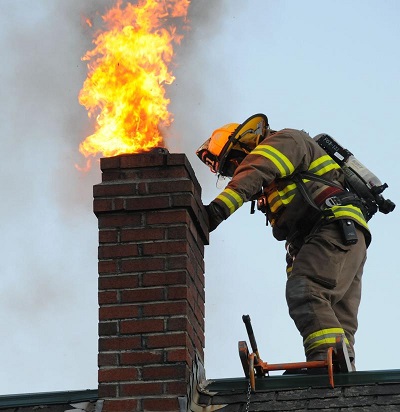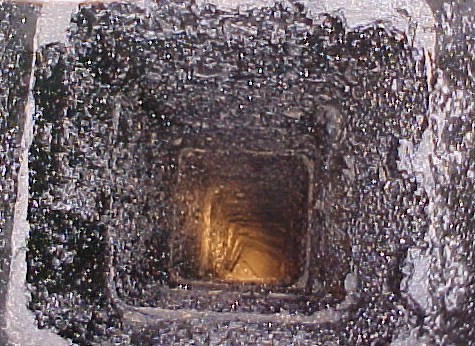|
Chimney Fires As you snuggle in front of a cozy fire or bask in the warmth of your wood stove, the last thing you are likely to be thinking about is the condition of your chimney. However, if you don't give some thought to it before you light those winter fires, your enjoyment may be very short-lived. Why? Dirty chimneys can cause chimney fires, which damage structures, destroy homes and injure or kill people. Chimney fires can burn explosively - noisy and dramatic enough to be detected by neighbors or passersby. Flames or dense smoke may shoot from the top of the chimney. Homeowners report being startled by a low rumbling sound that reminds them of a freight train or a low flying air plane. However, those are only the chimney fires you know about. Slow-burning chimney fires don't get enough air or have enough fuel to be as dramatic or visible. But, the temperatures they reach are very high and can cause as much damage to the chimney structure - and nearby combustible parts of the house - as a fast, explosive fire. With proper chimney system care, chimney fires are entirely preventable. Creosote & chimney fires: what you must know: Fireplaces and wood stoves are designed to safely contain wood-fueled fires, while providing heat for a home. The chimneys that serve them have the job of expelling the by-products of combustion - the substances given off when wood burns. As these substances exit the fireplace or wood stove, and flow up into the relatively cooler chimney, condensation occurs. The resulting residue that sticks to the inner walls of the chimney is called creosote. Creosote is black or brown in appearance. It can be crusty and flaky ... tar-like, drippy and sticky ... or shiny and hardened. Often, all forms will occur in one chimney system. Whatever form it takes, creosote is highly combustible. If it builds up in sufficient quantities - and catches fire inside the chimney flue- the result will be a chimney fire. Although any amount of creosote can burn, sweeps are concerned when creosote builds up in sufficient quantities to sustain a long, hot, destructive chimney fire. Certain conditions encourage the buildup of creosote, restricted air supply, unseasoned wood and cooler-than-normal chimney temperatures are all factors that can accelerate the buildup of creosote on chimney flue walls. Air supply: The air supply on fireplaces may be restricted by closed glass doors or by failure to open the damper wide enough to move heated smoke up the chimney rapidly (the longer the smoke's "residence time" in the flue, the more likely is it that creosote will form). A wood stove's air supply can be limited by closing down the stove damper or air inlets too soon and too much, and by improperly using the stovepipe damper to restrict air movement. Burning unseasoned firewood: Because so much energy is used initially just to drive off the water trapped in the cells of the logs - burning green wood keeps the resulting smoke cooler, as it moves through the system, than if dried, seasoned wood is used. Cool flue temperatures: In the case of wood stoves, fully-packed loads of wood (that give large cool fires and eight or 10 hour burn times) contribute to creosote buildup. Condensation of the unburned by-products of combustion also occurs more rapidly in an exterior chimney, for example, than in a chimney that runs through the center of a house and exposes only the upper reaches of the flue to the elements. How to keep the fire you want from starting one you don't! Chimney fires don't have to happen. Here are some ways to avoid them:
Proper Maintenance Clean chimneys don't catch fire. Make sure a CSIA Certified Chimney Sweep inspects your solid fuel venting system annually, and cleans and repairs it whenever needed. Your sweep may have other maintenance recommendations depending on how you use your fireplace or stove. CSIA recommends that you call on certified chimney sweeps, since they are regularly tested on their understanding of the complexities of chimney and venting systems. Signs you've had a chimney fire and what to do if you have one: Since chimney fires can occur without anyone being aware of them ... and since damage from such fires can endanger a home and its occupants, how do you tell if you've experienced a chimney fire? Here are the signs a professional chimney sweep looks for:
What to do if you have a chimney fire: If you realize a chimney fire is occurring, follow these steps:
Chimney fire articles provided by the Chimney Safety Institute of America.
11 Comments
11/1/2018 01:26:52 am
Nice post. I learn something more challenging on different blogs everyday. It will always be stimulating to read content from other writers and practice a little something from their store. I?d prefer to use some with the content on my blog whether you don?t mind. Natually I?ll give you a link on your web blog. Thanks for sharing.
Reply
7/16/2020 09:50:31 pm
The safety flood restoration thoughts I have ever seen and finding the great objectives always. Mostly finding here how to prevent from flood and fire restoration always,thanks.
Reply
3/29/2023 02:51:04 pm
I had no idea that woodstoves are prone to chimney fires. As you said, one approach to prevent them is to have them regularly inspected and cleaned by a professional. I appreciate you sharing this. I'll bear this in mind while I take care of our just-installed woodstove. Moreover, check for local businesses that can provide us with expert cleaning assistance.
Reply
4/3/2023 04:46:50 am
Chimney safety is of paramount importance, particularly during cold-weather months when the use of fireplaces and wood stoves increases. It is important to regularly inspect and maintain chimneys. In order to ensure a safe and efficient combustion process, it is necessary for homeowners to adhere to proper chimney maintenance protocols. Thank you! Helpful stuff.
Reply
It got me when you said that chimney fires can happen at any time without us being aware of them. I guess hiring chimney servicing companies would be a good investment to prevent these things from happening after we have used the fireplace a lot in the winter. This information is a huge help for us, because we have never had these amenities before in our past apartment.
Reply
6/20/2023 11:56:05 am
"Great blog post! Your insights on chimney fires were insightful and well-written. We'd love for you to visit our site on the same topic and share your thoughts. Keep up the fantastic work!
Reply
10/19/2023 02:53:25 am
Just read this article and I can say these are awesome great tips on how to take care of your Chimney Sweep in Salt Lake City. I will be using this tips for my own clients so that there Chimney Sweep in Salt Lake City,UT go smoothly!
Reply
4/5/2024 07:42:14 am
Looking for swift and reliable emergency mold removal services in Baltimore? Look no further than PeachTree Mold Removal in Baltimore. Our certified technicians are equipped to handle urgent mold situations, ensuring your safety and peace of mind. Backed by certifications from the Institute of Inspection, Cleaning and Restoration Certification (IICRC) and the National Association of Mold Professionals (NAMP), we adhere to the highest industry standards.
Reply
7/25/2024 04:58:05 am
Femme Works Solutions LLC is more than a commercial demolition contractor in North Andover, MA; we are a team of skilled professionals who bring a wealth of experience and technical expertise to every project. Our technical demolition services in North Andover, MA
Reply
Leave a Reply. |
See Our WorkAn All Season Control Cover in action speaks for itself. See how our product solves many types of chimney and fireplace issues. Archives
September 2015
Categories
All
|



 RSS Feed
RSS Feed
